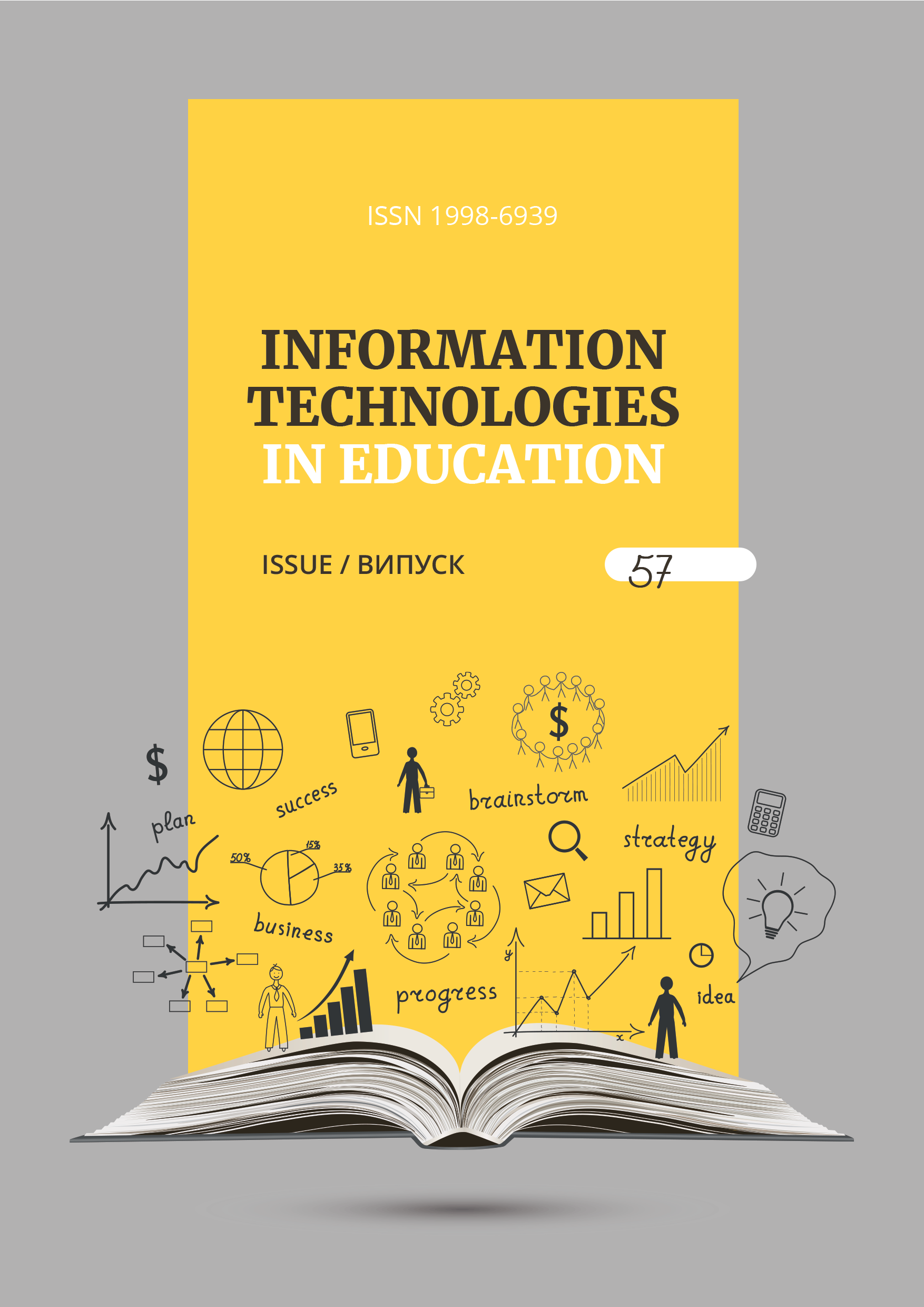CASE STUDY OF FUTURE DOCTORS OF PHILOSOPHY DIGITAL COMPETENCE FORMATION
DOI:
https://doi.org/10.14308/ite000789Keywords:
information and digital technologies, digital competence, doctoral studentsAbstract
The rapid digitalization across various spheres of human activity is reshaping the requirements of educational programs designed to train future Doctors of Philosophy (PhDs). This has sparked active discussions within the scientific community and higher educational institutions about the importance of developing digital competence among future Doctors of Philosophy.
This article examines the role and significance of information and digital technologies in research practice, focusing on contemporary approaches to defining the concept of digital competence for future PhDs. It highlights global initiatives, such as those by Vitae and JISC, which provide structured frameworks for describing the professional qualities and digital competencies necessary for researchers in both academic and organizational contexts.
Additionally, the article discusses practical experiences in organizing PhDs training through the course "Information and Communication Technologies in Scientific Research". The content of this course is aligned with the competencies and professional qualities required for conducting research, as outlined by these international frameworks.
A detailed survey was carried out among future Doctors of Philosophy, and the results are presented, shedding light on their needs regarding digital skills and the course content. The survey also reflects the PhDs' experiences with using digital tools in their research, the challenges they face, and the course’s influence on their development of digital competencies. The findings reveal a strong demand for the enhancement of digital skills across a broad spectrum, including the use of specialized tools, information management services, and digital communication platforms. These insights will be instrumental in further refining the course on the use of digital technologies in scientific research.
Downloads
Metrics
References
Yatsyshyn, A. V. (2020). Digital Open Systems in the Training of PhD and Doctoral Students. Kyiv: TsK "Komprynt".
MTsTU. (2021). Description of the Digital Competence Framework for Citizens of Ukraine. URL: https://thedigital.gov.ua/storage/uploads/files/news_post/2021/3/mintsifra-oprilyudnyue-ramku-tsifrovoi-kompetentnosti-dlya-gromadyan/%D0%9E%D0%A0%20%D0%A6%D0%9A.pdf
Spirin, O. M., & Odud, O. A. (2016). Model for Developing Information and Communication Competence of a Doctor of Philosophy Based on the Use of Cloud Services like Google Scholar. Information Technologies and Learning Tools, 56 (6), 204–218.
Topolnyk, Ya. V. (2018). Information and Communication Support System for Scientific Research of Future Master's and PhD Students in the Field of Education. Sloviansk: Publisher B.I. Matorina.
Topolnyk, Ya. V. (2019). Pedagogical Conditions for the Effectiveness of Information and Communication Support for Scientific Research of Future Master's and PhD Students in the Field of Education. Young Scientist, 9 (73), 104–108. doi: 10.32839/2304-5809/2019-9-73-23
Bykov, V. Yu., Spirin, O. M., & Shyshkina, M. P. (2015). Corporate Information Systems for Supporting Scientific and Educational Activities Based on Cloud-Oriented Services. Problems and Prospects of Forming the National Humanitarian-Technical Elite: Collection of Scientific Papers, 43 (47), 178–206.
MTsTU. (2021). Conceptual-Referential Framework for the Digital Competence of Teaching and Academic Staff (Project). URL: https://osvita.diia.gov.ua/uploads/0/2629-frame_pedagogical.pdf
Vitae. (2011). Research Development Framework. Careers Research and Advisory Centre (CRAC) Limited. URL: www.vitae.ac.uk/jss
JISC. (2022). Researcher role profile. Retrieved August 15, 2024, URL: https://repository.jisc.ac.uk/8862/1/2022_BDC_Researcher_Profile.pdf
Spirin, O. M., & Odud, O. A. (2016). Content of the Educational Material for the Special Course "Cloud Information and Analytical Technologies in the Research Process. Information Technologies and Learning Tools, 52 (2), 108–120. URL: https://journal.iitta.gov.ua/index.php/itlt/article/view/1374
Ivanova, S. M. (2018). The Problem of Developing Information and Research Competence among Scientific and Scientific-Pedagogical Workers through the Use of Electronic Scientific and Educational Systems. Information Technologies and Learning Tools, 6(68), 291–305. doi: 10.33407/itlt.v68i6.2693.
Lutsenko, G. V. (2022). Self-Assessment by Doctor of Philosophy Candidates of the Level of Digital Competence Development. Bulletin of the Glukhiv National University Named After Oleksandr Dovzhenko, 3 (50), 43–52. doi: 10.31376/2410-0897-2022-3-50-43-52
Nylander, E., & Hjort, M. (2022). Information Literacies of PhD Students: A Hermeneutic Dialectic Study within the Health Sciences. New Review of Academic Librarianship, 28 (2), 172–192. doi: 10.1080/13614533.2020.1819353
Bell, D. L. (2021). A qualitative investigation of the digital literacy practices of doctoral students. Journal of Information Literacy, 15 (3), 82–99. doi: 10.11645/15.3.2829
Gouseti, A. (2017). Exploring doctoral students’ use of digital technologies: what do they use them for and why? Educational Review, 69 (5), 638–654.
Kuzminska, O., Morze, N., Varchenko-Trotsenko, L., Boiko, M., & Prokopchuk, M. (2021). Digital Competence of Future Researchers: Empirical Research of PhD Students of Ukrainian University. DHW 2021: Digital Humanities Workshop, (pp. 177–184). doi: 10.1145/3526242.3526258
Aghaee, N., Jobe, W. B., Karunaratne, T., Smedberg, A., Hansson, H., & Tee, M. (2016). Interaction gaps in PhD education and ICT as a way forward: Results from a study in Sweden. International Review of Research in Open and Distance Learning, 17(3).
Dowling, R., & Wilson, M. (2015). Digital doctorates? An exploratory study of PhD candidates' use of online tools. Innovations in Education and Teaching International, 76–86. doi: 10.1080/14703297.2015.1058720
Douglas, A. S. (2020). Engaging doctoral students in networking opportunities: a relational approach to doctoral study. Teaching in Higher Education, 1–17. doi: 10.1080/13562517.2020.1808611
Kaur, A., Kumar, V., & Noman, M. (2022). Partnering with doctoral students in research supervision: opportunities and challenges. Higher Education Research & Development, 41(3), 798–803. doi: 10.1080/07294360.2020.1871326
Downloads
Published
How to Cite
Issue
Section
License
Copyright (c) 2025 Галина Луценко

This work is licensed under a Creative Commons Attribution-NonCommercial-ShareAlike 4.0 International License.
This work is licensed under a Creative Commons Attribution-NonCommercial-ShareAlike 4.0 International License.






























